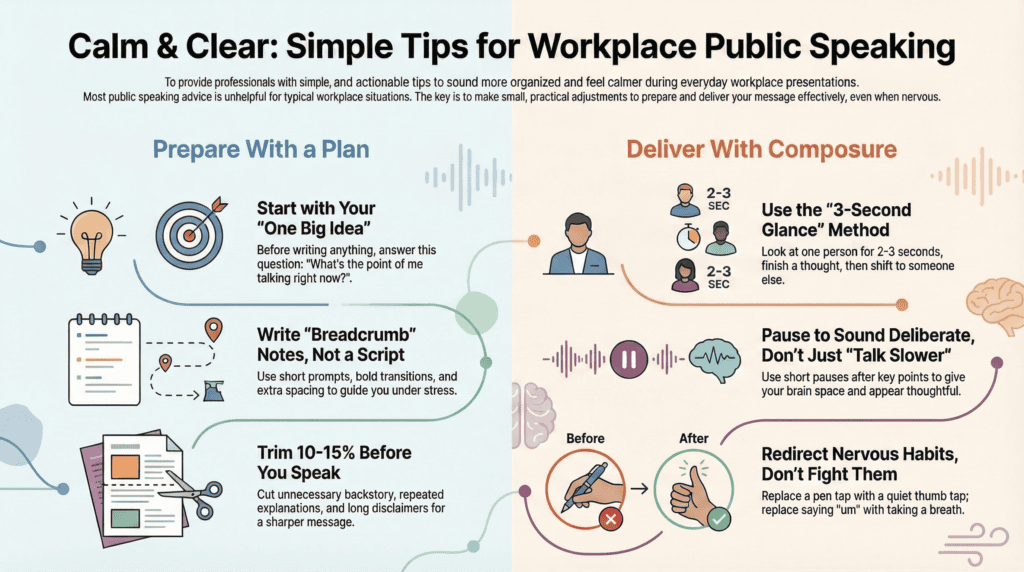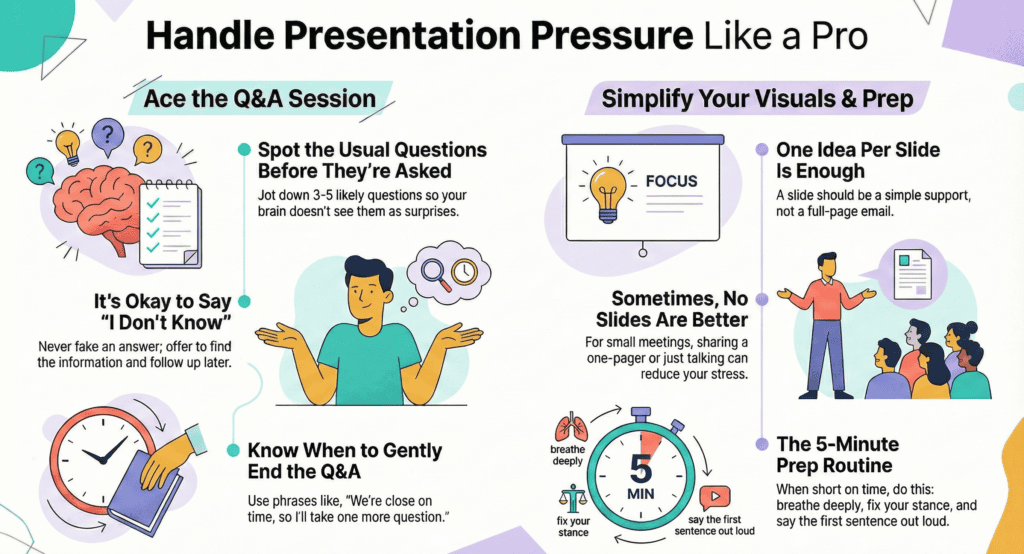Most people don’t want to become a full time “public speaker,” heck, some people actually have a phobia of it.
They just want to get through a team update without stumbling over every other sentence… or avoid that moment where five people look up from their laptops because you suddenly lost your place. When people talk about public speaking, they usually jump straight to confidence tips and tricks or “imagine everyone in their underwear” type nonsense. That’s not helpful at work. You’re not doing a TedTalk. Your only goal is to explain something to your coworkers; in a way that doesn’t feel rushed, confusing, or stiff.
The tips in this guide are built for exactly that. They’re small adjustments that make you sound more organized and calm without turning you into someone you’re not. No fluffy motivational quotes. No “Master Your Fears!” Just simple public speaking tips and changes that help you sound more organized, more relaxed, and more clear. Whether you’re giving a short meeting update, running a small training, speaking to a whole department, or even just practicing job interview questions these habits work across all of it.

Image created by the Diversity Employment Team
Start With the Point (Most Talks Fail Here)
A lot of speaking anxiety comes from one simple thing… Not being totally sure what your main point even is. You might think you know, but if someone asked you to summarize your idea in one clear sentence, you’d probably need more than one line and end up rambling. Because if you’re not locked in, the people listening won’t be either.
Most workplace talks fall apart because the speaker is juggling way too many ideas at once. You’re trying to explain the background, the updates, the numbers, the “just so you know” details… and somewhere in the middle, you lose your thread.
The easiest public speaking tip is boring but powerful: decide on your one big idea before you say a single word out loud.
Define Your “One Big Idea” First
This isn’t a slogan or a fancy opening line. It’s the simple answer to:
“What’s the point of me talking right now?”
Examples of a clear big idea:
- “We’re behind because the vendor missed the deadline.”
- “We need leadership to approve the budget increase.”
- “This change will make the process faster for everyone.”
- “We need to revise the hiring page so it reflects our equal opportunity employer commitments.”
When you know the point, you sound calmer and more direct. Your brain stops trying to juggle everything at once.
Make Notes That Work Under Pressure
Most people write notes like a script. Then they freeze when they try to read it under stress.
A better approach:
- Short phrases instead of long sentences
- Extra spacing
- Bold or highlight the transitions
- Keep every line to a single idea
When your nerves spike, your brain needs clean breadcrumbs, not paragraphs.
Trim 10-15% Before You Speak
This is the part nobody wants to do… but it makes the biggest difference.
Cut a little bit of:
- Backstory
- Repeated explanations
- Examples that aren’t necessary
- Long disclaimers (“This might sound confusing but…”)
- Anything that starts with “I just want to add…”
Removing even a small chunk makes everything feel sharper and easier to deliver.
Deliver Your Message in a Way Your Brain Can Handle
A lot of public speaking tips sound great on paper but completely falls apart when you try to apply it in real life. On a physical level, your brain acts differently when you’re talking in front of people, even the coworkers you actually like. Your thoughts can speed up while your mouth tries to catch up; and suddenly everything feels a little scrambled.
The goal here isn’t to “perform.” It’s to deliver a message in a way your brain can manage when you’re slightly stressed, slightly rushed, and trying not to trip over your own words.
Lets’ cover some small adjustments that will help you sound clearer and feel calmer.
1. The “3-Second Glance” Method for Eye Contact
Most people try to scan the whole room. That’s when you feel the panic rise.
A better way:
- Look at one person for 2–3 seconds
- Finish a thought
- Shift your eyes to someone else
- Repeat
Short bursts of eye contact make your whole delivery smoother; because you’re only focusing on one person at a time. It also stops you from just staring down at your notes, like they contain state secrets.
And yes! This works on Zoom too. Instead of staring directly into the camera the whole time (which feels unnatural), glance between the camera and one person’s video tile as you finish each idea.
2. Slow Down by Pausing, Not Dragging Your Words
People say “talk slower” like it’s easy. Well, it’s not. When you’re nervous, your voice just… speeds up.
Trying to force slow speech usually makes people sound robotic.
Pausing is different. A pause is a micro-reset. It gives your brain space, gives your audience space, and makes your delivery feel more deliberate. All without losing your natural rhythm.
Use pauses:
- Right after you finish a point
- Right before something important
- Any time you need to gather yourself
No one thinks you “forgot” anything. They think you’re being thoughtful.
3. Practice the First 20 Seconds… That’s It
Most speaking anxiety hits at the beginning. Once you get moving, the nerves drop by half.
Instead of rehearsing the entire talk (which makes you sound memorized and stiff), just get the opening down clean.
Something simple like:
- Who you are (if needed)
- What you’re covering
- Why it matters
Twenty seconds of stability at the start makes the rest feel smoother.
4. Use Real Work Examples Instead of Abstract Explanations
People understand concrete stories better than concepts.
And you feel more confident when you’re talking about something you’ve actually lived.
Compare:
- “Improving cross-team communication is important…” → vague
- “Last month we had a delay because we weren’t aligned on deadlines…” → clear and grounded
Real examples make your message stick, and your nerves usually drop because you’re speaking from experience, not theory.
Manage Nerves Without Trying to “Be Confident”
Public speaking tips have more in common with entrepreneurial skills than people realize. You’re managing uncertainty, staying composed under pressure, and moving forward even when you don’t feel ready. Telling someone to “be confident” before speaking is useless. Confidence isn’t a button you can switch on. And honestly, most people don’t even need confidence. They just need to stop fighting their nerves so their thoughts can come out in order.
Your goal isn’t to eliminate nervousness.
It’s to function well even when you feel it.
A few small shifts can make that a lot easier.
Replace nervous habits instead of fighting them
Everyone has a few default “nervous tells”:
- Tapping fingers
- Saying “um” every two seconds
- Swaying
- Clicking a pen
- Apologizing for no reason
Trying to stop those habits directly usually makes them worse because you’re now stressed about the habit on top of being stressed about speaking.
A better approach is replacing them with something neutral:
- Tap your thumb on your index finger under the table instead of tapping a pen
- Take a quick breath instead of filling silence with “um”
- Plant your feet shoulder-width apart instead of rocking from side to side
You’re not eliminating the habit, you’re redirecting it into something manageable.
Anchor your hands so your gestures look natural
When people get nervous, their hands either freeze or start doing strange, robotic motions.
Anchoring helps:
- Rest one hand lightly on the table
- Or gently interlace your fingers at chest height
- Or touch your fingertips together
Anchoring keeps your hands grounded until your gestures return naturally. Once your brain calms down a bit, your hands will follow.
Avoid:
- Both hands in pockets (creates tension)
- Crossed arms (closed-off vibe)
- Over-pacing (looks unsure)
You don’t have to be perfectly still — just stable.
Reset lines when you blank (“Let me back up one second…”)
Blanking out happens to everyone. And, it doesn’t make you look unprepared; it can make you relatable, when done right. Instead of panicking or apologizing fifty-times, use a reset line:
- “Let me back up for a second.”
- “Here’s the part I want to highlight…”
- “Let me rephrase that;”
These lines give your mouth something to say while your brain catches up.
It feels smooth to the audience and buys you a few seconds of calm.
Silence isn’t Failure it’s Processing
People are afraid of silence because they think it looks like they don’t know what they’re doing. But short pauses actually make you look more controlled and deliberate.
A few seconds of silence:
- Helps your audience digest
- Gives you breathing room
- Makes people lean in
- Breaks up long stretches of talking
Silence is a tool, not a mistake.
Prepare for Questions Without Overthinking
For a lot of people, the talking part itself is not the scary part.
It’s the moment someone says, “I have a question…” and every thought in your head scatters.
You don’t need a perfect answer for everything. You just need a few simple public speaking tips that help feel less blindsided.
Spot the Usual Questions Before They’re Asked
Most workplace questions are very similar:
- What’s the deadline?
- Are we already late?
- Is anything about my job changing?
- Is there going to be more, or less, work for the team to do?
Before your presentation, take a few minutes to scribble down the three to five things you are most likely to get asked. Don’t polish a script. Just rough notes:
- “What if [X] falls through?”
- “What happens if [Y] doesn’t approve it?”
- “Who’s responsible for [Z]?”
When you’ve already seen those questions on paper, your brain doesn’t think of them as surprises. You’re just picking which version of the answer you want to say out loud.
Saying “I Don’t Know” Without Looking Lost
Sometimes the question really is outside your lane. Or maybe it’s a detail you just haven’t checked up on yet.
Never fake it. Lines like these work well:
- “I don’t have that specific number right now; but I know where to find it and can get it to you after this.”
- “Thanks [Name], that’s a great question. I need to double-check that first, before I answer I want to make sure I’m giving you the right info.”
Follow it up with something that will reiterate your point:
- “I’ll follow up with finance and email the group this afternoon by EOD.”
- “Let me check with the vendor and I’ll add it to the next update.”
You’re not being tested on memory. You’re showing you’re careful and honest.
Knowing When to Wrap Q&A
Q&A can drift. One person asks something helpful. The next goes deep into a side issue. Now you’re ten minutes over and half the room has mentally checked out.
You’re allowed to close it down gently:
- “We’re close on time, so I’ll take one more question.”
- “If you have detailed questions, grab me after this or send me a message.”
Then bring it back to your main point in one sentence:
“The key thing I want you to remember is…”
That way the last thing people hear isn’t a random side thread. It’s the reason you were talking in the first place.

Image created by The Diversity Employment Team
Make Your Visuals Simpler (Your Slides Are Making You Nervous)
Sometimes the problem isn’t fail public speaking tips at all. It’s the deck.
You’re trying to glance at the clock, read tiny text, remember what you meant to say, and watch people’s reactions. That’s too much load for one brain.
Simpler visuals give you less to juggle and make it easier for people to follow along.
One Idea Per Slide is Enough
If a slide looks like a full-page email, it’s doing way too much.
A good rule:
- One main sentence or
- One short list or
- One chart/graphic
You do the explaining. The slide is just a support.
If you keep hearing yourself say things like, “I know this is a lot,” that’s your cue that the slide needs to be broken up.
Make it Readable Without Effort
There is no need to win a design award for a presentation. Just don’t make people squint.
Keep it:
- High contrast (dark text on light colors, or the reverse)
- Bigger fonts than you think you need
- Minimal colors and font changes
You want eyes on you and the message… Not lost in a busy layout trying to decode what’s on the screen or what’s actually important.
When It’s Better With NO Slides At All
Not every update deserves a deck. For small internal meetings, it can be easier to:
- Share a one-pager
- Talk through the key points
- Answer questions as they come up
Zero slides = One less thing to worry about. If visuals won’t actually add clarity, they’re just adding noise.
When You’re Short on Time
In a perfect world, you have days to get everything ready and prepare. In real life, someone Slacks you and says, “Can you speak on this in the 2:30 meeting?” and now you’ve got an hour. Maybe even less.
What you do should depend on how much time you actually have to get ready.
If You Only Have Five Minutes
You realistically don’t have time to fully rehearse. But… you do have time to reset your mind & body a bit.
Try this quick sequence:
- 40-Seconds of Breathing: Inhale for 4 seconds, exhale for 6. Do that four times. It’s simple, but it takes the “edge” off.
- Fix Your Stance: Both feet flat. Uncross your arms. Drop your shoulders. This helps your voice come out steadier.
- Say the First Sentence Once Out Loud: Just the opener. “Here’s where the project stands,” or whatever your first line is.
Hearing yourself say it one time makes it feel familiar when you say it again in the room.
That’s pretty much all you can do in five minutes, and it can be enough.
If You Have About a Week
With a few days, you can smooth things out without over-prepping.
Some things that actually help:
- Get a quick gut check from someone you trust. “Does this order make sense?” their feedback is usually enough.
- Cut the part you’re dreading. If there’s a section you keep avoiding when you practice, it might be too long or unnecessary.
- Run through transitions instead of every word. Practice how you move from point A to B:
- “That’s the current state. Now here’s what’s changing.”
- “Let’s switch over to the numbers for a second.”
You’re owning the flow, not memorizing a stale monologue.
If You’re Just Worn Out
Sometimes it’s not a “speaking skill” issue. You’re just tired.
If you’re running on low battery:
- Keep your message shorter on purpose
- Stick to that main point and just a couple of supporting details
- Offer follow-up questions in chat or email form, instead of trying to cover everything then and there
You’re allowed to choose a simpler version of the talk when your energy is low. Clear and short beats long and scattered.
Public Speaking Gets Easier When You Simplify Everything
A lot of public speaking tips pile more work on you: more rules, more tricks, more things to remember.
People don’t need that. They need less.
Less content.
Simpler slides.
Notes their brain can read in a hurry.
A few small habits that make them feel steady instead of scrambled.
If you strip things down to:
- One clear reason you’re talking
- A handful of points you actually have time to say
- A basic plan for questions
- And a calmer opening
…you’re already ahead of most of the room.
You don’t have to turn into a polished “speaker.” You just have to be understandable and steady when it matters. The rest is practice and repetition, not personality.




